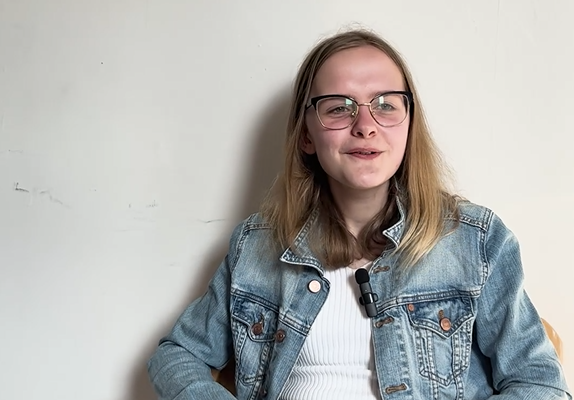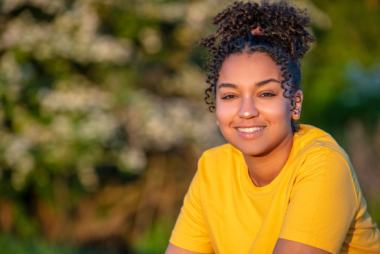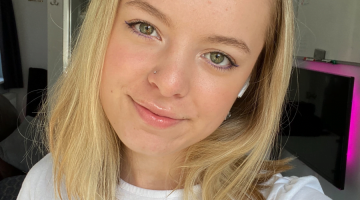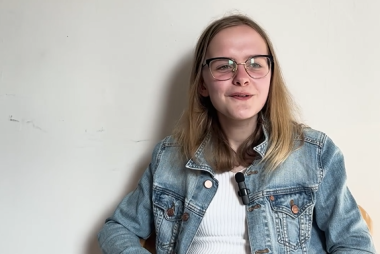Emi is one of our e-wellbeing Youth Researchers. After experiencing her own mental health struggles at a young age, Emi was determined to help other young people like herself. She is working hard with the support of our e-wellbeing team to encourage conversations in schools about mental health and wellbeing, and to reassure young people that they are not alone. Emi tells us more below:
How did you hear about e-wellbeing?
At school we have Mental Health Champions – students who try to improve the mental health of other students. Leon (e-wellbeing) came into the school to talk about the programme, and I thought wow, that sounds really interesting.
I’m really enjoying being a Mental Health Champion. We’ve already done a survey and got some results and are going to present them to my head teacher.
Can you tell us more about the Youth Research Project and why you wanted to get involved?
I wanted to get involved because I have been affected by feeling like I did not belong and have experienced my own mental health struggles. It felt like I was different from others and that I couldn’t fit in. Before the Youth Research Project, I didn’t know that there were also other people who felt the same way.
To decide the topic, we spoke about which ideas inspired us the most. We were choosing between isolation and lack of belonging but then we decided to mix them together. So, we’re now doing research on both the lack of belonging and loneliness within secondary schools.
My aim is to make people aware that anyone can struggle from a lack of belonging and loneliness and make teachers aware so that they can try to help people feel like they fit in more.
TW: Eating disorder
Emi’s personal experience with mental health
I lived in Switzerland before I moved here, but I am Polish. I didn’t fit in because my accent was different from the Swiss children. They bullied me a lot and it felt like my whole class was against me. We didn’t have school uniform either so they would tell me my clothes were ugly or bully me about the way I looked.
They also said that I was fat and that I ate too much, so I stopped eating. This led me to really struggle with an eating disorder. I had to go to a clinic for three months. I cried a lot and felt like everyone was really rude, forcing me to eat without explaining why. I also didn’t think that I fitted in at the clinic because it felt like all the other people there had more serious issues than me. Eventually, I started to eat again because I wanted to be back with my family. I always looked at the picture of my parents on the wall and I really missed them.
When I left the clinic to live back with my parents, I felt like my family started to support me. I’ve learnt that rather than making your mental health smaller, you need to make your life bigger.
Do you think young people are still worried to talk about mental health?
There is a bias in my school. For example, when there’s a conflict between two groups of people, they start calling names that have a link to mental health. And then people will hear this and think that it is not worth talking about their mental health because they fear that they will be excluded by others.
Me and my friends talk a lot about mental health and rather than seeing ourselves as different from others, we appreciate being different and we say that we are special.
To combat the bias, teachers could talk about mental health as a topic in other subjects, not just PSHE. There could be more assemblies about mental health, so people know it is not an off-limit topic. This could also eliminate the bias by saying that mental health struggles don’t always start big, they can also be smaller things like stress about exams, which can link to anxiety or feeling bad about yourself.
Do you feel like projects such as the Mental Health Champions are helping to start those conversations?
People are open to talk about it there, but outside of Mental Health Champions we haven’t really done anything to improve things amongst every student at school. We’re working on eliminating discrimination and bullying at school, which we will be doing through making the system of reporting bullying easier – for example, giving students the chance to report bullying online so they don’t have to be seen doing it in person, keeping it anonymous.
What could be done to help with mental health and the lack of belonging amongst students?
It would be good if the waiting time for diagnosis was much shorter because some people wait for years. People don’t take others seriously if they are not yet diagnosed, as they don’t fit into a specified group of people. They don’t get extra help in school even though they might need it. Teachers need to look out for students and notice the little things. Perhaps speak to them after a lesson and ask them if they are alright.
I also hope in the future that there will be more places or groups available for people who are struggling with mental health conditions to go to and speak with people who are going through a similar thing to them.
What words of advice would you have for someone who might be struggling with their mental health and wellbeing?
If someone is waiting to be diagnosed or get professional help, I would tell them to look online to get some tips on how to care for themselves. I would also tell them to not be ashamed of themselves for having struggles or for not fitting in.
If they are feeling low, they could speak to the Samaritans. They are there for all types of people and not just those who might have severe depression or anxiety. They can support you through things like if you’re having arguments with friends. They have an online chat where you wait just five minutes for someone to come and then you can chat with them, which really helps. They are also suitable for people under the age of 18.





